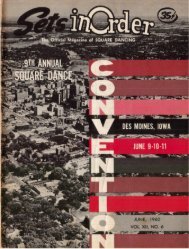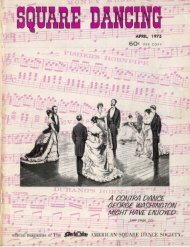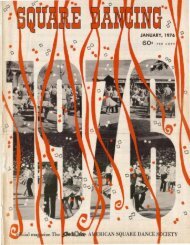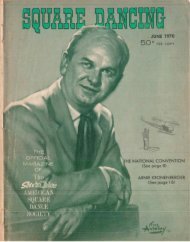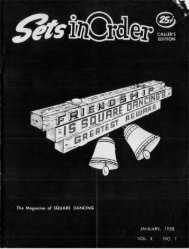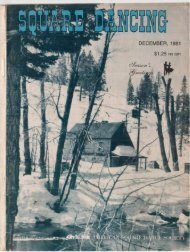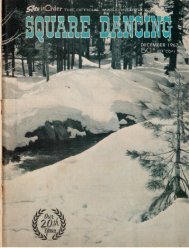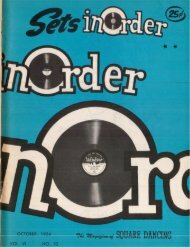- Page 2 and 3:
KYNEWISBOK 71 is the seventy-third
- Page 7:
I wonder when,the beginning of the
- Page 11 and 12:
8UGENERALFr,shmtJnEIIGL/SN,2
- Page 13:
Thrust in among the books,the faces
- Page 17:
You are different everydayA progr
- Page 21:
To be a part ofeverything that touc
- Page 26:
The worlds inside you:the dreams, t
- Page 29:
The situationsThe soundsand the mot
- Page 33:
The intellect of manis forced to ch
- Page 38 and 39:
"At that time Iwould not have cared
- Page 40 and 41:
Director of PlacementsB.A., M.A.- U
- Page 42 and 43:
" ... I see the role of the Vice Ch
- Page 44 and 45:
"We have enoughproblems right now t
- Page 46 and 47:
It is important to note that the ro
- Page 48 and 49:
... 'you have finally convinced met
- Page 50 and 51:
"We have been thrust into an urban
- Page 52 and 53:
"People cannot escape having a fait
- Page 54 and 55:
Dr. Donald Belden is in his fifteen
- Page 57 and 58:
Technological development is an imp
- Page 60 and 61:
Seventeen western utilities from De
- Page 62:
Another problem is that of abandone
- Page 67 and 68:
Steven Bennett AbramsChicago, Illin
- Page 69 and 70:
Ronald Everett BedellPenacook, New
- Page 71 and 72:
Rebecca Susan BrymerSylvania, OhioR
- Page 73 and 74:
Scott Charles DeanerWestminster, Co
- Page 75 and 76:
Curtis Helmut EngelmannWilmington,
- Page 77 and 78:
Cindy Ellen GoldsteinDenver, Colora
- Page 79 and 80:
janet B. HanzalekRamsey, New jersey
- Page 81 and 82:
Ralph Henry HopfenbergUniondale, Ne
- Page 83 and 84:
Ellen SzitaPolitical ScienceI have
- Page 85 and 86:
Scott A. LancelotDenver, ColoradoMa
- Page 87 and 88:
John Jewett Lowrey, Jr.Honolulu, Ha
- Page 89 and 90:
Evelyn Kay McDivittLa junta, Colora
- Page 91 and 92:
Thomas A. NeillEvanston, IllinoisDe
- Page 93 and 94:
Sue C. ParrottMinneapolis, Minnesot
- Page 95 and 96:
-.,,,;' , .... ,,•.. 4 I'92
- Page 97 and 98:
Shirley Fay RussellDenver, Colorado
- Page 99 and 100:
William james Sheppard, Jr.Watsonvi
- Page 101 and 102:
Kendra Kolehma StrawWaukegan, Illin
- Page 103 and 104:
Ruth Alger VucichLittleton, Colorad
- Page 105 and 106:
Sarah Parkman WilliamsDedham, Massa
- Page 107:
104
- Page 111 and 112:
108The time is fitting that man fun
- Page 113 and 114:
PanhellenicI am as diverse and indi
- Page 115 and 116:
Not shown:Nancy WanishJudy RayWendy
- Page 117 and 118:
1. Debbie Blanchard 13. Hollie Harr
- Page 119 and 120:
Kappa DeltaThe most I can do for my
- Page 121 and 122:
118Not shown :Dede RushtonSue Shube
- Page 123 and 124:
120
- Page 125 and 126:
122
- Page 127 and 128:
Sigma Delta Tau"We are here to add
- Page 129 and 130:
La, I am black, but I am comely too
- Page 131 and 132:
128
- Page 133 and 134:
Executive CouncilOrder of Omega1. S
- Page 135 and 136:
Alpha Kappa PsiTo a lot of Denver s
- Page 137 and 138:
The Alpha Zeta Chapter of Beta Thet
- Page 141 and 142:
138
- Page 143 and 144:
Not shown:Steve BaerJames Bergstrom
- Page 145 and 146:
'II II ,1/142
- Page 147 and 148:
Not Shown:Daniel ArizumiPete AsherT
- Page 149:
Theta ChiTheta Chi ...United by Bro
- Page 152 and 153:
~~~--------------------~~~~--------
- Page 154 and 155:
... Hi, Mom. No, your roof wasn't f
- Page 156 and 157:
1. Ji m Ro be rts2. Ru ss Sto ut3.
- Page 158:
What we cannot do for a lifetime we
- Page 161 and 162:
158FallSports
- Page 163 and 164:
Varsity Water Polo RosterBruce Ande
- Page 165 and 166:
The Air Force Academy game usually
- Page 167 and 168:
Varsity Soccer RosterWeSeason Summa
- Page 170 and 171:
Going to a women's sporting event i
- Page 172 and 173:
168WinterSports
- Page 174 and 175:
After nine consecutive winning seas
- Page 176 and 177:
It was nerve-racking for many. Afte
- Page 178 and 179:
'-..J ~ -- '---jim Karabetsos173
- Page 180 and 181:
Varsity Hockey RosterRick BragnaloM
- Page 183 and 184:
Murray ArmstrongVarsity Gymnastics
- Page 185 and 186:
180Spring Sports
- Page 187 and 188:
Varsity Lacrosse RosterHarris KuhnW
- Page 189 and 190:
Tennis was another Spring Sport tha
- Page 191 and 192:
Varsity Tennis RosterMike BrewenJoh
- Page 193 and 194:
Although often considered to have o
- Page 195 and 196:
Intramural WinnersAll School Champi
- Page 197 and 198: Every man must justify his existenc
- Page 199 and 200: ~~victories that are easy are cheap
- Page 201: 196
- Page 206 and 207: Experience is the child of thought,
- Page 208 and 209: Where the rivers of timeAre fouled
- Page 210: 205
- Page 213 and 214: 208
- Page 215 and 216: The Denver media called it a shanty
- Page 217 and 218: Woodstock West ...Nation of Peace a
- Page 219 and 220: All I can think of is flying a kite
- Page 221 and 222: 215
- Page 223 and 224: Fall Festival orNovember Nonsense?2
- Page 225 and 226: 219
- Page 227 and 228: Why is it that those elements which
- Page 229 and 230: The Theatre ...a Victim of Misdirec
- Page 231 and 232: The barracks are still on cam pusde
- Page 233 and 234: 227
- Page 235 and 236: 229
- Page 237 and 238: Almost without question, the most p
- Page 240 and 241: May Days"\tV erequashed .../234
- Page 242 and 243: Herb Kaplow~~Great Issues of Our Ti
- Page 244 and 245: 238Eugene McCarthy
- Page 246 and 247: Disruption was inherent in the appe
- Page 250 and 251: It's purpose is toextend the learni
- Page 252 and 253: . .. .\ ? upThe Union -the epitome
- Page 254 and 255: 248... being President
- Page 256 and 257: There were a lot of new faces compe
- Page 258 and 259: Students were not the only group wo
- Page 260 and 261: ... flaming-women's libtradition ..
- Page 262 and 263: WinterCarnival;the big event -The t
- Page 264 and 265: ... the best of adifferentculture .
- Page 266 and 267: They are a new generation; each dif
- Page 268 and 269: 262Others rebel in a soft murmur, t
- Page 270 and 271: 264
- Page 272 and 273: 266
- Page 274 and 275: 268They are optimistic and moral, b
- Page 276 and 277: 270~ ... it just happened."
- Page 278 and 279: If people need us""e're around272
- Page 280 and 281: ~ ... at leastit's a start.""The Ed
- Page 282 and 283: 276
- Page 284 and 285: ... the prejudicesare more subtle .
- Page 286 and 287: 280
- Page 288 and 289: 282
- Page 291 and 292: the dogmas of the quiet past are in
- Page 293 and 294: 287
- Page 295 and 296: A love of music and the desire to s
- Page 297 and 298: Circle K, I to r: Reid Pixler, Jack
- Page 299 and 300:
L to r, top row; Marie Friedmann, P
- Page 301 and 302:
L tor, row 1; Conrad Lorbiecki, Gen
- Page 304 and 305:
As a service organization, the DURo
- Page 306 and 307:
300
- Page 308 and 309:
AWS wanted to create its own revolu
- Page 310:
304
- Page 313 and 314:
What in the hell can studentgovernm
- Page 315 and 316:
309
- Page 317 and 318:
WITHINWithin the pages (8, 12 or 28
- Page 321:
WHAT the hell is a kynewisbok?What
- Page 325 and 326:
319
- Page 327:
321
- Page 330 and 331:
Abr~ms, Steven - MarketingBernell,
- Page 332 and 333:
Hirschboeck, Katherine - Elementary
- Page 334 and 335:
Ramsberser, Tho mas -Ralh, Deborah
- Page 336 and 337:
IF YOU DON'T FIND US HERE ...A. U.S
- Page 338 and 339:
Eilering, Lance . . . . . . . . 71E
- Page 340 and 341:
Sander, Rickie . . . . . . . . . .
- Page 342:
KYNEWISBOK 71EditorCopy EditorsEduc



